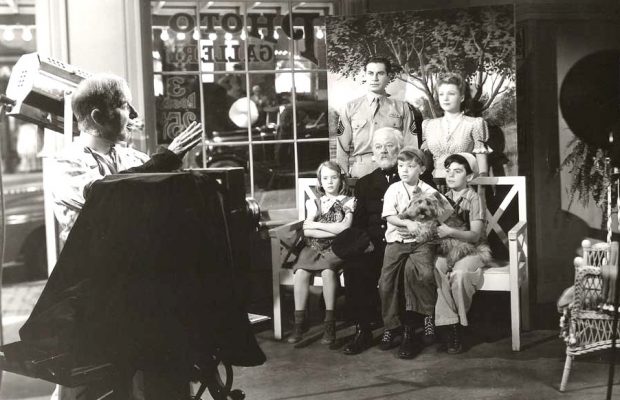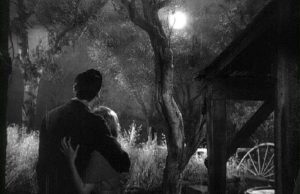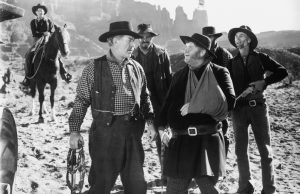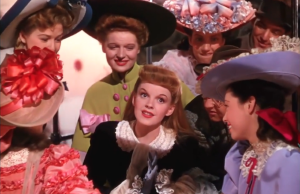Sunday Dinner for a Soldier (1944)

Toronto Film Society presented Sunday Dinner for a Soldier (1944) on Monday, November 14, 2016 in a double bill with Pilgrimage as part of the Season 69 Monday Evening Film Buff Series, Programme 3.
Production Company: Twentieth Century Fox. Producer: Walter Morosco. Director: Lloyd Bacon. Screenplay: Melvin Levy and Wanda Tuchock, based on a story by Martha Cheavens. Music: Alfred Newman. Cinematography: Joseph MacDonald. Film Editor: J. Watson Webb Jr. Art Direction: J. Russell Spencer and Lyle R. Wheeler. Set Decoration: Thomas Little and Fred J. Rode. Costumes: Kay Nelson.
Cast: Anne Baxter (Tessa Osborne), John Hodiak (Sgt. Eric Moore), Charles Winninger (Dudley ‘Granfeathers’ Osborne), Anne Revere (Agatha Butterfield), Connie Marshall (Mary Osborne), Chill Wills (Mr. York), Robert Bailey (Kenneth Normand), Bobby Driscoll (Jeep Osborne), Jane Darwell (Mrs. Helen Dobson), Rory Calhoun (Solider in Truck), Chester Conklin (Photographer).
The musical score for Sunday Dinner for a Soldier was composed by well-known and prolific composer Alfred Newman. Newman scored over 200 films. He won nine Academy Awards and was nominated for forty-three. He is known as one of the three godfathers of film music during Hollywood’s Golden Age; the other two are Max Steiner and Dimitri Tiomkin.
Newman was born on March 17, 1900 in New Haven, Connecticut, the eldest of 10 children. He began piano lessons at age 5, and by age 8 was considered a local piano prodigy. He became a pupil of some well-known and respected musicians, including Rubin Goldmark. Goldmark also had Aaron Copland and George Gershwin as pupils. By age 12, Newman was playing piano in theatres and restaurants to help support his family. At 13, he began touring on the vaudeville circuit, where he was billed as “The Marvellous Boy Pianist”. While on tour, he was sometimes allowed to conduct the orchestra, which made him want to be a full-time conductor. He was fortunate, in that he was taught the basics of conducting by William Merigan Daly, an experienced conductor and composer. By the time he was 15, Newman was regularly conducting matinée performances. He so impressed the conductor of the Cincinnati Symphony that he was invited to be a guest conductor.
When Newman was 19, he began a ten-year career as a conductor of musicals by the likes of George Gershwin, Jerome Kern, and Richard Rogers. He was invited to Hollywood by Irving Berlin to conduct his score for the film Reaching for the Moon. This led to a contract with Samuel Goldwyn to continue as a film composer. He was the musical director for Charlie Chaplin’s City Lights while the music was written by Chaplin, himself. Newman went on to act as musical director, and write the scores for, many films in the 1930s, including Indiscreet, Wuthering Heights, Gunga Din, Beau Geste, The Hunchback of Notre Dame, and Alexander’s Ragtime Band, for which he won an Academy Award. In 1940, he began a twenty-year career as a music director with 20th Century Fox Studios.
Alfred Newman was noted for developing what came to be known as the Newman System, a means of synchronizing the performance and recording of a musical score with the film; a system which is still in use today. Newman’s scores were developed around the overall mood of each film. He also tailored specific themes to accompany different characters as they appeared on screen, thereby enhancing each actor’s role. The effects of this style of music created a forceful but less jarring score which connected the entire story, thereby keeping the film’s theme more easily understood by viewers.
Newman was known to study period music, hymns, folk music, and traditional music from other countries to assimilate into his film scores. His ability to create moods of discomfort and fear, as in The Snake Pit, or the uplifting mood of Anne Frank and the oppressiveness of the Nazis, in The Diary of Anne Frank, are examples of his talent. He composed the familiar fanfare which accompanies the studio logo at the beginning of Fox’s productions and still introduces Fox pictures today. As a music director, it was Newman’s job to find and select suitable composers for various films. His influence made possible the careers of Bernard Hermann, Alex North, and David Raskin.
Alfred Newman comes from a very talented family, and some of his children are awesome talents like their father. His brother Lionel scored films and television shows as well as adapting and conducting scores for over a hundred films. Another brother, Emil, was music director for over eighty films. His sons David and Thomas have scored over 175 films between them. His daughter Maria is an eminent musician and composer. His nephew, Randy Newman, has won three Emmys, six Grammys, and two Academy Awards.
Along with his Academy Awards, Alfred Newman has a star on the Hollywood Walk of Fame and, in 1999, the United States Postal Service issued a stamp in his honour. He was married to Martha Louise Montgomery (born December 5, 1920 in Clarksdale, Mississippi; died May 9, 2005 in Pacific Palisades, California), a former actress and Goldwyn Girl, from 1947 to his death in 1970. They had five children. Alfred Newman died at his home in Hollywood on February 17, 1970 from complications of emphysema. He was 69.
Notes by Bruce Whittaker













Leave a Reply